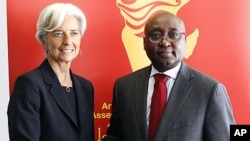The Zimbabwe government has requested the African Development Bank (ADB) to scale up its financial support for the country.
Finance Minister Patrick Chinamasa on Friday met the bank’s regional director, Ebrima Faal, as Harare looked to the ADB for advice on how to use its vast mineral resources to raise money and shore up an economy that has slowed since the start of the year.
Addressing journalists after the meeting, Mr. Chinamasa said the ADB has provided financial support for the rehabilitation of infrastructure in the country and the resuscitation of the local industry.
He said Harare would be happier to see the bank increasing its support for various projects in Zimbabwe.
The finance minister said they discussed ways in which Zimbabwe can settle its huge foreign debt with the bank and other multilateral institutions so that it can borrow money at concessionary rates.
Zimbabwe owes the ADB about $800 million and more than one billion dollars to other multilateral institutions such as the World Bank and the International Monetary Fund.
Minister Chinamasa said Zimbabwe badly needs capital to finance all sectors of the economy.
He said Zimbabwe has engaged the ADB to assist in designing ways through which the mineral-rich country can use its natural resources to unlock capital for national development.
The country has the second-largest platinum reserves in the world after South Africa, one of the biggest diamond deposits and large quantities of coal and gold, but has grappled with a weak economy blamed by critics on veteran President Robert Mugabe’s populist policies.
Growth in the country is forecast at 3.4% this year, down from a previous projection of 5%, with prospects weighed down partly by the disputed July 31 election and fears over the rolling out of the controversial black empowerment programme.
Zimbabwe has also asked the ADB to help the country re-engage Western financial institutions such the Bretton Woods institutions that have suspended support and find ways to clear its $10 billion foreign debt.
Mr. Chinamasa said Zimbabwe cannot remain poor in the midst of vast resources hence the need for the country to securitize its natural resources.
On the other hand, Mr. Faal said the ADB remains a trusted partner to African countries and supports them despite the many challenges they face.
Zimbabwe has been isolated from the international community for more than 10 years and started re-engaging the international community with the formation of the inclusive government 2009.
It is yet unclear how the re-engagement will continue but the European Union has since started a process to remove the Zimbabwe Mining Development Corporation from its sanctions list.
Finance Minister Patrick Chinamasa on Friday met the bank’s regional director, Ebrima Faal, as Harare looked to the ADB for advice on how to use its vast mineral resources to raise money and shore up an economy that has slowed since the start of the year.
Addressing journalists after the meeting, Mr. Chinamasa said the ADB has provided financial support for the rehabilitation of infrastructure in the country and the resuscitation of the local industry.
He said Harare would be happier to see the bank increasing its support for various projects in Zimbabwe.
The finance minister said they discussed ways in which Zimbabwe can settle its huge foreign debt with the bank and other multilateral institutions so that it can borrow money at concessionary rates.
Zimbabwe owes the ADB about $800 million and more than one billion dollars to other multilateral institutions such as the World Bank and the International Monetary Fund.
Minister Chinamasa said Zimbabwe badly needs capital to finance all sectors of the economy.
He said Zimbabwe has engaged the ADB to assist in designing ways through which the mineral-rich country can use its natural resources to unlock capital for national development.
The country has the second-largest platinum reserves in the world after South Africa, one of the biggest diamond deposits and large quantities of coal and gold, but has grappled with a weak economy blamed by critics on veteran President Robert Mugabe’s populist policies.
Growth in the country is forecast at 3.4% this year, down from a previous projection of 5%, with prospects weighed down partly by the disputed July 31 election and fears over the rolling out of the controversial black empowerment programme.
Zimbabwe has also asked the ADB to help the country re-engage Western financial institutions such the Bretton Woods institutions that have suspended support and find ways to clear its $10 billion foreign debt.
Mr. Chinamasa said Zimbabwe cannot remain poor in the midst of vast resources hence the need for the country to securitize its natural resources.
On the other hand, Mr. Faal said the ADB remains a trusted partner to African countries and supports them despite the many challenges they face.
Zimbabwe has been isolated from the international community for more than 10 years and started re-engaging the international community with the formation of the inclusive government 2009.
It is yet unclear how the re-engagement will continue but the European Union has since started a process to remove the Zimbabwe Mining Development Corporation from its sanctions list.





